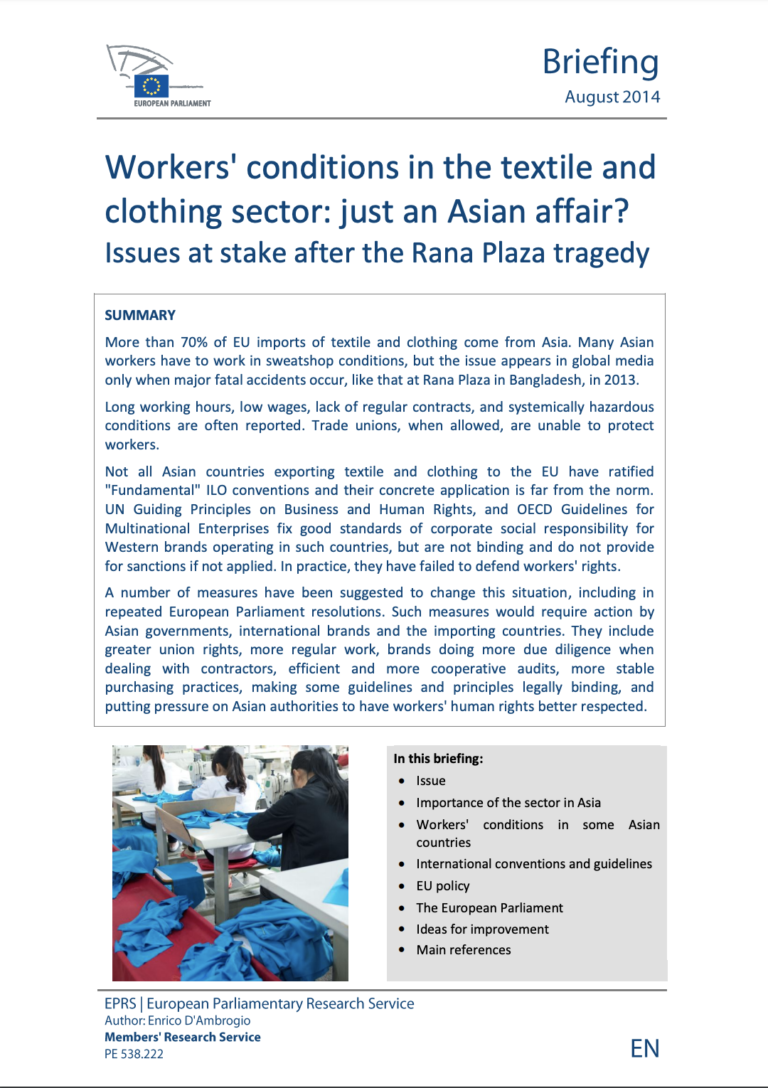Guiding Principles on Business and Human Rights
The UN Guiding Principles on Business and Human Rights are a set of guidelines for States and companies to prevent, address and remedy human rights abuses committed in business operations. child labour
Written by Enrico D’Ambrogio
More than 70% of EU imports of textile and clothing come from Asia. Many Asian workers have to work in sweatshop conditions, but the issue appears in global media only when major fatal accidents occur, like that at Rana Plaza in Bangladesh, in 2013.
Long working hours, low wages, lack of regular contracts, and systemically hazardous conditions are often reported. Trade unions, when allowed, are unable to protect workers.
Not all Asian countries exporting textile and clothing to the EU have ratified “Fundamental” ILO conventions and their concrete application is far from the norm. UN Guiding Principles on Business and Human Rights, and OECD Guidelines for Multinational Enterprises fix good standards of corporate social responsibility for Western brands operating in such countries, but are not binding and do not provide for sanctions if not applied. In practice, they have failed to defend workers’ rights.
A number of measures have been suggested to change this situation, including in repeated European Parliament resolutions. Such measures would require action by Asian governments, international brands and the importing countries. They include greater union rights, more regular work, brands doing more due diligence when dealing with contractors, efficient and more cooperative audits, more stable purchasing practices, making some guidelines and principles legally binding, and putting pressure on Asian authorities to have workers’ human rights better respected.

The UN Guiding Principles on Business and Human Rights are a set of guidelines for States and companies to prevent, address and remedy human rights abuses committed in business operations. child labour
The OECD Guidelines for Multinational Enterprises are recommendations addressed by governments to multinational enterprises operating in or from adhering countries. They provide non-binding principles and standards for responsible business conduct in a global context consistent with applicable laws and internationally...
Violence and harassment at work causes harm to individuals, families, businesses and societies. It affects people’s lives, dignity, health and wellbeing. It also exacerbates inequality in societies and undermines business productivity. There shoul...Read More
Survivor Bank Accounts, designed specifically to be set up without proof of identification or an address, are a positive form of recognition and empowerment for survivors. They provide financial independence and demonstrate the importance of providi...Read More
There is a highrisk of exploitation within the hotel sector due to its vulnerable workforce, complex supply chains with little transparency, and limited oversight from brands and multinational hotel companies as a result of extensive franchising. In...Read More
This year’s General Report zooms in on the impact of information and communication technology (ICT) on trafficking in human beings. Countries monitored by GRETA have reported an increased use of ICT for recruiting and controlling victims of traffi...Read More